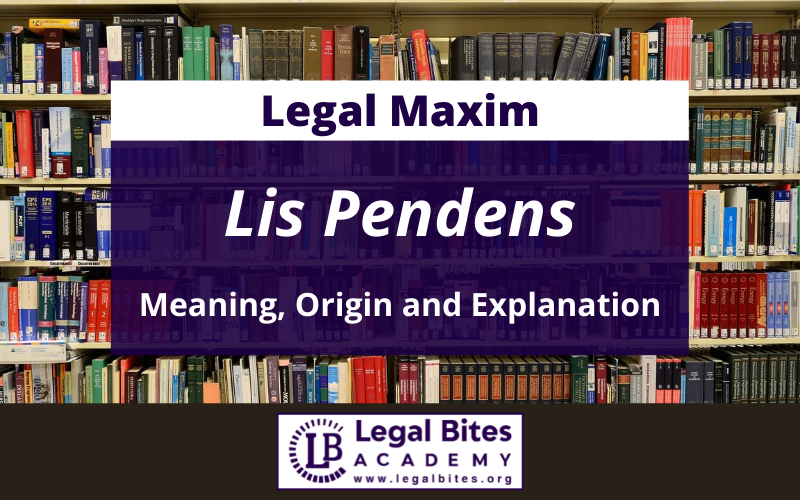Lis Pendens: Meaning, Origin and Explanation
This article titled ‘Lis Pendens: Meaning, Origin and Explanation’ is written by Sahajpreet Bhusari and discusses the doctrine of Lis Pendens. I. Meaning and Origin Lis Pendens is a legal maxim of Latin origin. In Latin, the maxim literally means ‘pending legal suit’.[1] II. Explanation A ‘notice of pending action’ is referred to as Lis Pendens. The theory of… Read More »

This article titled ‘Lis Pendens: Meaning, Origin and Explanation’ is written by Sahajpreet Bhusari and discusses the doctrine of Lis Pendens. I. Meaning and Origin Lis Pendens is a legal maxim of Latin origin. In Latin, the maxim literally means ‘pending legal suit’.[1] II. Explanation A ‘notice of pending action’ is referred to as Lis Pendens. The theory of Lis Pendens can be characterised as the jurisdiction that courts have over the property involved in...
This article titled ‘Lis Pendens: Meaning, Origin and Explanation’ is written by Sahajpreet Bhusari and discusses the doctrine of Lis Pendens.
I. Meaning and Origin
Lis Pendens is a legal maxim of Latin origin. In Latin, the maxim literally means ‘pending legal suit’.[1]
II. Explanation
A ‘notice of pending action’ is referred to as Lis Pendens. The theory of Lis Pendens can be characterised as the jurisdiction that courts have over the property involved in the action while it is pending. A written notification that a lawsuit has been filed involving the title to real property or an interest in that real property in general.
III. Application
The doctrine is enshrined in Section 52 of the Transfer of Property Act of 1882, which bans the alienation of immovable property while a legal dispute over it is underway in a competent court. It is based on the idea that a person who purchases an immovable property from a judgement debtor while the suit is pending has no independent right to property to resist, obstruct, or object to the decree’s execution.
In India, courts are divided into three categories: territorial, pecuniary, and subject matter jurisdiction. As a result, the suit must be pending in the court with jurisdiction to hear the case; otherwise, the rule of Lis Pendens will not apply.
The doctrine solely applies to immovable property; it does not apply to moveable property. A specific right in immovable property must be litigated, such as a disagreement over title, possession, or a right of alienation, for example.
The Lis Pendens doctrine relates to sales, particular execution of contracts, mortgage suits, easements, pre-emption, and the charge established by a Hindu widow on Hindu Joint Family Property, among other things. It is not, however, applicable to litigation involving debts, rents, accounts (home tax), and so on.
IV. Illustration
Property F is owned by A, and it is managed by B with A’s agreement. B, on the other hand, sells the property to C. A launches a lawsuit against B to restore custody of the property, but C is not named as a defendant. C, on the other hand, sells the property to Y. The theory of Lis Pendens will not influence C’s transfer because he is not a party to the lawsuit.
V. Case Laws
The Supreme Court held in Hardev Singh v. Gurmail Singh[2] that Section 52 of the Act does not render a pendente lite transfer by a party to the suit unlawful or illegal, but merely binds the pendente lite purchaser to the pending litigation’s result.
Thus, if any right of immovable property is directly and specifically in question during the pendency of any suit in a court of competent jurisdiction that is not collusive, such immovable property cannot be transferred by any party to the suit so as to affect the rights of any other party to the suit under any decree that may be made in such a suit.
The Supreme Court held in T.G. Ashok Kumar v. Govindammal & Anr.[3] that if the pendente lite transferor’s title to the transferred property is upheld, the transferee’s title will not be harmed.
If the pendente lite transferor’s title is recognised or accepted only in relation to a portion of the transferred property, the transferee’s title will be saved only to that extent, and the transfer in relation to the remaining portion of the transferred property will be null and void, and the transferee will have no right, title, or interest in that portion.
The transferee will not have any title to the property if the property transferred pendente lite is wholly awarded to another party or parties, or if the transferor is found to have no right or title to the property.
References
[1] Lis Pendens, Available Here.
[2] Appeal (civil) 6222 of 2000.
[3] CIVIL APPEAL NO.10325 OF 2010.


